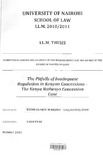| dc.description.abstract | Despite the central role that transport plays in the economy of a country, many nations do not have efficient infrastructure for the transport of goods and persons. This is largely due to insufficient funding for laying down the transport infrastructure, which often requires huge amounts of money. For developing countries where funding for such basic needs as food and health services are not available, investment in efficient transport becomes a secondary objective of the government.
In order to fill these gaps in funding for infrastructure, many governments are now initiating reforms in the transport sector, primarily aimed at opening the space for private investors to finance transportation infrastructure. The most widespread feature of infrastructure reforms in developing countries and emerging economies over the past 15 years has been the establishment of new regulatory laws, institutions, contracts, regimes, and processes.
These regulatory systems are designed to respond to natural monopolies and market failures associated with network industries such as electricity, gas, water, telecommunications, and transport. The aim of regulation is to encourage efficient, low-cost, and reliable service provision while ensuring financial viability and new investment.
This paper looks at the various options for private sector participation in infrastructure, with a focus to concessions in railway infrastructure. Looking at the concessioning of the Kenya-Uganda Railway, the paper concludes that the main reason behind the numerous challenges that faced the concession (during negotiations and after signing the agreement) can be traced to the lack of a proper legal and regulatory framework for concessions in Kenya. Using a comparative analysis, the paper investigates international best practices for the legal and regulatory framework for the negotiation and management of railway concessions which can be adopted by Kenya. | en_US |

